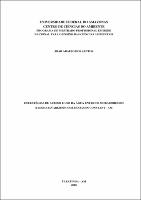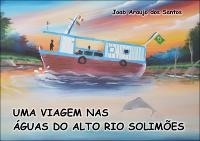| ???jsp.display-item.social.title??? |


|
Please use this identifier to cite or link to this item:
https://tede.ufam.edu.br/handle/tede/6696Full metadata record
| DC Field | Value | Language |
|---|---|---|
| dc.creator | Santos, Joab Araújo dos | - |
| dc.creator.Lattes | http://lattes.cnpq.br/8549242196033145 | por |
| dc.contributor.advisor1 | Rapozo, Pedro Henrique Coelho | - |
| dc.contributor.advisor1Lattes | http://lattes.cnpq.br/2679908172389276 | por |
| dc.date.issued | 2018-08-20 | - |
| dc.identifier.citation | SANTOS, Joab Araújo dos. Estratégias de acesso e uso da água entre os moradores do Bairro Javarizinho em Benjamin Constant - AM. 2018. 101 f. Dissertação (Mestrado em Ensino das Ciências Ambientais) - Universidade Federal do Amazonas, Tabatinga-AM, 2018. | por |
| dc.identifier.uri | https://tede.ufam.edu.br/handle/tede/6696 | - |
| dc.description.resumo | A água é fundamental para que haja vida no planeta. No entanto, ainda existem muitas pessoas que ainda não tem acesso a água tratada em quantidade suficiente. A água, infelizmente está deixando ser um bem comum, e passando a ser um bem de valor econômico. Outro fator importante a ser considerado é falta de políticas públicas destinadas aos moradores. Podemos destacar ainda a questão da degradação ambiental. A pesquisa é do tipo estudo de caso e teve como procedimento inicial o levantamento da percepção ambiental dos moradores do bairro Javarizinho, na cidade de Benjamin Constant - AM, verificando como esses acessam a água, qual a relação dos mesmos com o rio Javarizinho, e os igarapés existentes no bairro, como o pulso dos rios influenciam no cotidiano de vida dos moradores. Durante a pesquisa pode-se perceber que existem muitas residências que não possuem água encanada. Isso obriga os moradores a utilizarem a água diretamente do rio, muitas vezes sem nenhum tratamento. Percebeu-se ainda que o rio Javarizinho possui grande relevância social e econômica, pois o mesmo é utilizado para a pesca, lazer, transporte, uso doméstico, agricultura, turismo. No entanto, existe um alto índice de doenças de veiculação hídrica no bairro pelo fato do esgoto ser despejado diretamente no rio sem nenhum tratamento, e pela grande quantidade de lixo que é descartado nele. Fica claro que mesmo o rio sendo utilizado de múltiplas formas, ainda é preciso trabalhar muito com os moradores, bem como os fazedores de políticas públicas visando sensibilizá-los da importância da conservação do bem comum. Nesse sentido, a escola tem um papel fundamental na formação dos discentes, pois ensinar ciências ambientais é fundamental para termos mais qualidade de vida e consequentemente, garantir um ambiente saudável para a atual e as futuras gerações. Com o resultado da pesquisa foi desenvolvido uma cartilha com o objetivo de ensinar ciências para discentes de educação básica. | por |
| dc.description.abstract | Water is fundamental to life on the planet. However, there are still many people who still do not have access to enough treated water. Unfortunately, water is letting it be a common good, and it becomes a good of economic value. Another important factor to consider is the lack of public policies aimed at the residents. We can also highlight the issue of environmental degradation. The research is a case study and had as initial procedure the survey of the environmental perception of the residents of the neighborhood Javarizinho, in the city of Benjamin Constant – AM, verifying how they access water, how they relate to the Javarizinho River, and the streams existing in the neighborhood, such as the pulse of the rivers, influence the daily life of the residents. During the research one can realize that there are many residences that do not have piped water. This forces residents to use the water directly from the river, often without any treatment. It was also realized that the river Javarizinho has great social and economic relevance, since it is used for fishing, leisure, transportation, domestic use, agriculture, tourism. However, there is a high rate of waterborne diseases in the neighborhood due to the fact that sewage is discharged directly into the river without any treatment, and because of the large amount of waste that is discarded in it. It is clear that even when the river is used in multiple ways, it is still necessary to work hard with residents and public policymakers to sensitize them to the importance of conserving the common good. In this sense, the school has a fundamental role in the training of students, because teaching environmental sciences is fundamental to have a better quality of life and, consequently, to ensure a healthy environment for the current and future generations. With the result of the research a primer was developed with the objective of teaching sciences to students of basic education. | eng |
| dc.format | application/pdf | * |
| dc.thumbnail.url | https://tede.ufam.edu.br//retrieve/24863/Disserta%c3%a7%c3%a3o_Joab%20Santos_PROFCIAMB.pdf.jpg | * |
| dc.thumbnail.url | https://tede.ufam.edu.br//retrieve/24865/Prod.Educ._Joab%20Santos_PROFCIAMB.pdf.jpg | * |
| dc.language | por | por |
| dc.publisher | Universidade Federal do Amazonas | por |
| dc.publisher.department | Centro de Ciências do Ambiente | por |
| dc.publisher.country | Brasil | por |
| dc.publisher.initials | UFAM | por |
| dc.publisher.program | Rede Nacional para o Ensino das Ciências Ambientais | por |
| dc.rights | Acesso Aberto | por |
| dc.rights.uri | http://creativecommons.org/licenses/by-nc-nd/4.0/ | - |
| dc.subject | Educação Ambiental | por |
| dc.subject | Percepção ambiental | por |
| dc.subject | Políticas públicas | por |
| dc.subject | Resiliência | por |
| dc.subject.cnpq | CIÊNCIAS AGRÁRIAS | por |
| dc.title | Estratégias de acesso e uso da água entre os moradores do Bairro Javarizinho em Benjamin Constant - AM | por |
| dc.type | Dissertação | por |
| Appears in Collections: | Mestrado Profissional em Rede Nacional para o Ensino das Ciências Ambientais | |
Files in This Item:
| File | Description | Size | Format | |
|---|---|---|---|---|
| Dissertação_Joab Santos_PROFCIAMB.pdf | 5.51 MB | Adobe PDF |  Download/Open Preview | |
| Prod.Educ._Joab Santos_PROFCIAMB.pdf | 24.59 MB | Adobe PDF |  Download/Open Preview |
This item is licensed under a Creative Commons License





